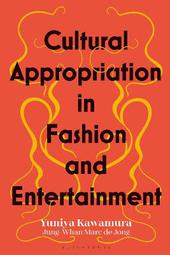
|
Cultural Appropriation in Fashion and Entertainment
Paperback / softback
Main Details
| Title |
Cultural Appropriation in Fashion and Entertainment
|
| Authors and Contributors |
By (author) Yuniya Kawamura
|
|
By (author) Jung-Whan Marc de Jong
|
| Physical Properties |
| Format:Paperback / softback | | Pages:240 | | Dimensions(mm): Height 234,Width 156 |
|
| Category/Genre | Fashion design and theory |
|---|
| ISBN/Barcode |
9781350170551
|
| Classifications | Dewey:306 |
|---|
| Audience | | Tertiary Education (US: College) | |
|---|
| Illustrations |
40 bw illus
|
|
Publishing Details |
| Publisher |
Bloomsbury Publishing PLC
|
| Imprint |
Bloomsbury Visual Arts
|
| Publication Date |
14 July 2022 |
| Publication Country |
United Kingdom
|
Description
Is it ever acceptable to "borrow" culturally inspired ideas? Who has ownership over intangible culture? What role does power inequality play? These questions are often at the center of heated public debates around cultural appropriation, with new controversies breaking seemingly every day. Cultural Appropriation in Fashion and Entertainment offers a sociological perspective on the appropriation of race, ethnicity, class, sexuality, and religion embedded in clothing, textiles, jewelry, accessories, hairstyles and tattoos, as well as in entertainment, such as K-pop, Bhangra, and hip-hop. By providing a range of global perspectives on the adoption, adaptation, and application of both tangible and intangible cultural objects, Kawamura and de Jong help move the conversation beyond simply criticizing designers and creators to encourage nuanced discussion and raise awareness of diverse cultures in the creative industries.
Author Biography
YUNIYA KAWAMURA is Professor of Sociology at the Fashion Institute of Technology, New York, USA. She is the author of four other Bloomsbury publications: Fashioning Japanese Subcultures (2012), Sneakers (2016), Fashion-ology (2004, 2018), and Doing Research in Fashion and Dress (2011, 2020). Jung-Whan Marc de Jong is Associate Professor of Sociology at Fashion Institute of Technology, New York, USA.
ReviewsThis is a timely examination of the problems inherent in the way that dominant cultures have taken inspiration from minority groups in ways that have been exploitative. This book makes an important contribution to the wider, political call for an urgent reappraisal of attitudes and inequalities that have had a devastating effect on many communities. -- Janice Miller, Head of School of Critical Studies and Creative Industries, Kingston School of Art, Kingston University, UK
|